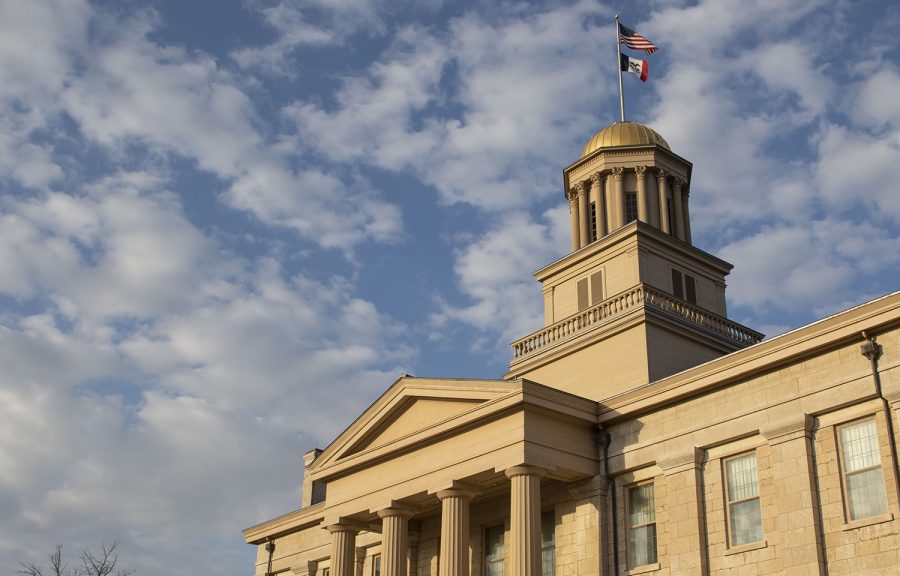Federal court of appeals rules against University of Iowa in religious student organization case
In 2017, the university claimed Business Leaders in Christ, the student group involved, violated the UI Human Rights Policy after a student filed a discrimination complaint. A federal court of appeals affirmed that decision.
The Old Capitol building is seen on March, 6, 2021.
March 22, 2021
The 8th U.S. Circuit Court of Appeals on Monday ruled in favor of the student organization Business Leaders in Christ at the University of Iowa after the group was dismantled in 2017 by the UI’s claim of a violation of the university’s Human Rights Policy.
As previously reported by The Daily Iowan, Marcus Miller, a UI sophomore at the time, filed a discrimination complaint against the Business Leaders in Christ after the group revoked a leadership position from Miller upon finding out his sexual orientation.
Business Leaders in Christ is a Christian student group that helps business students live out their faith in the workplace, according to a press release from the Becket Fund for Religious Liberty, the law firm representing the organization.
“The university initially recognized its members as some of the best students on campus and assured them they could select leaders who embraced their faith,” the release said. “But the university later did an abrupt about-face, accusing BLinC of discrimination and kicking it off campus.”
The federal court of appeals ruled in a similar manner as the district court, but reversed the district court’s grant of “qualified immunity” for the UI administrators on Business Leaders in Christ’s free-speech violation claims, the ruling stated.
Qualified immunity is protection for mistaken judgments about unresolved issues of law, according to the case ruling document.
The ruling states that “state organizations can’t target religious groups for differential treatment or withhold an otherwise available benefit solely because they are religious.”
Eighth U.S. Circuit Court of Appeals Judge Jonathan Allen Kobes wrote in the ruling that “administrators at the University of Iowa discriminated against religious student groups.”
Kobes added that the university and individual defendants do not appeal that finding. A UI spokesperson said the UI is reviewing its options.
“The university is currently reviewing the decision and its options,” Director of Media Relations Anne Bassett wrote in an email to the DI in response to Monday’s ruling.
In 2019, the court held the UI’s co-defendants, Thomas Baker, assistant dean of students at the time, Lyn Redington, a former UI dean of students, and William Nelson, executive director of the Iowa Memorial Union, in violation of Business Leaders in Christ’s constitutional rights.
RELATED: Court rules UI discriminated against student group
The district court said the UI “deliberately exempted some groups from its Human Rights Policy.”
“The undisputed evidence show[ed] BLinC was prevented from expressing its viewpoints on protected characteristics while other student groups… [were] permitted to do so,” according to the case document.
The district court’s ruling stated that the UI’s actions knowingly violated a clearly established law and engaged “in a ‘textbook violation’ of BLinC’s First Amendment rights,” according to Business Leaders in Christ’s appeal.
As previously reported by the DI, other student organizations have also been examined in the last five years regarding limitations to leadership positions. Imam Mahdi, a UI student organization and Muslim-registered group, guarantees equal opportunity and equal access to membership, but membership is sorted into two different levels of involvement.
An individual must be 18 years or older and are required to be Muslim, Shia, and have a recommendation from two other members to qualify for the top-level of membership in the organization.
The UI’s Registration of Student Organizations policy states that membership and participation in the organization have to be open to any classification of student that would deprive the person of consideration as an individual.
The policy also states that the organization will guarantee that equal opportunity and equal access to membership and benefits should be available to all members.






